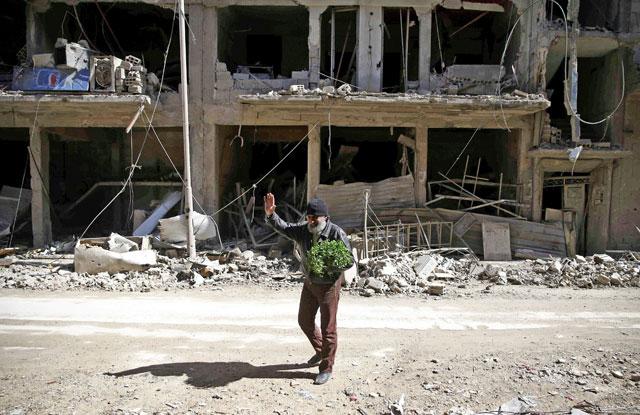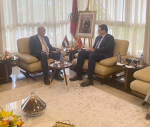You are here
France to seek backing for new mechanism to assign blame for chemical attacks
By Reuters - May 17,2018 - Last updated at May 17,2018
PARIS — France will on Friday seek commitments from some 30 countries to support the creation of a new mechanism at the world's chemical weapons watchdog to enable it to assign blame for attacks carried out with banned munitions, French diplomats said.
The Organisation for the Prohibition of Chemical Weapons (OPCW) in The Hague currently only determines whether such attacks have taken place, not who carried them out.
France's move comes in the wake of a suspected poison gas attack by Syrian government forces east of Damascus in early April. Syria and its ally Russia denied that any attack had taken place and that they were holding up inspections or had tampered with evidence at the site.
Before the OPCW was able to carry out inspections — which in any case would not have assigned blame — the United States, France and Britain launched missile attacks on Syria's chemical weapons-related facilities.
A new OPCW mechanism could assign blame for attacks, a job which had been carried out from 2015 by a joint United Nations-OPCW investigation in Syria, until its renewal was vetoed by Russia in November.
France has discussed the idea in the last few months with its closest allies — Britain, the United States and Germany. But taking such a proposal to the OPCW would need the support of dozens of nations.
On Friday, France hosts a meeting of 33 countries, all in the OPCW and members of an international group targeting toxic gas attacks. France launched the latter group in January.
The "Impunity Partnership" aims at preserving evidence of chemical weapons attacks, recording those responsible for attacks and imposing sanctions on those responsible.
"We won't accept that Russia's blockage leads us to having a situation where we have an incomplete system," a French diplomatic source said. He said Paris wanted to create the political momentum to enlarge the partnership and make it "a "driving force" within the OPCW.
Creating a global mechanism for accountability is seen as important due to a rising number of incidents with nerve agents since they were banned two decades ago under an international treaty.
Recent use includes the assassination with VX of Kim Jong-nam, half-brother of North Korean leader Kim Jong-un, in Kuala Lumpur Airport in February 2017 and the attempted murder of Sergei Skripal, a 66-year-old former Russian double agent, and his daughter with a Novichok nerve agent in March in England. They both survived.
But the French proposal is likely to meet resistance from Russia, Iran and others.
Decisions at the OPCW are usually put to a vote by the 41-seat executive council, where 28 votes are needed to pass. Recent initiatives at the OPCW to condemn Syria for using chemical weapons have not garnered enough support.
The alternative is to go to the OPCW’s full 192-seat conference of states, which can intervene to ensure compliance with the 1997 Chemical Weapons Convention, which has been violated repeatedly by the use of sarin, chlorine and sulphur mustard gas in Syria.
Friday’s meeting will also look to collate the respective countries’ evidence of chemical attacks and other ways to push blame either through the OPCW or UN Countries are also likely to see the impose new national sanctions on people and entities linked to chemical weapons attacks.
Related Articles
THE HAGUE/PARIS — Western powers are weighing a French proposal to create a new mechanism at the world’s chemical weapons watchdog that woul
THE HAGUE — A preliminary report by the world’s chemical weapons watchdog said “various chlorinated chemicals” were found at the site of an
AMSTERDAM — The world's chemical weapons watchdog opened an investigation on Sunday into attacks in the besieged, rebel-held Syrian region o

















